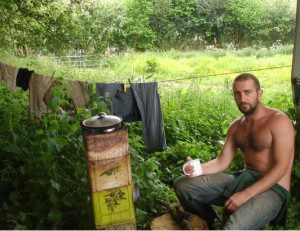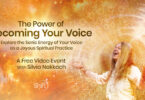Guest Writer for Wake Up World
Mark Boyle is the author of The Moneyless Man and The Moneyless Manifesto, and is the founder of Freeconomy. After studying economics and business in college, he managed two organic food companies in Bristol, UK. In 2007, a pivotal conversation with a friend sparked the realization that “money… creates a kind of disconnection between us and our actions” and he set up the Freeconomy Community. A few months later, Boyle inspired by the non-violent salt march Gandhi led across India and America’s Peace Pilgrim, he decided to live a more self-sufficient life without money, which he’s done for the last five years.
Mark insists that a moneyless life is not a new idea – it’s the system of money itself that’s a new development, existing for only a small fraction of human history.
I decided to interview Mark, not only because I believe money has had such a detrimental effect on the DNA of modern culture. But also, his story is remarkably inspiring in that, in a short period of time, he achieved great clarity of purpose and acted on it with such urgency and integrity. He embodies a courageous spirit that the world desperately needs right now.
Q: How did you come to the decision to embark on the moneyless journey and how did your background as a trained economist influence you?
A: “There is an entire spectrum of ecological, social and personal reasons why I now believe that it’s imperative that we, collectively and individually, wean ourselves off our dependency on money to meet our needs. However, it began as many journeys do with an initial impulse. It was 2007 and I had been feeling overwhelmed by the horrors I was witnessing around me – factory farming, homogenisation of cultures, bottom-trawling, sweatshops, deforestation, the mechanisation of our livelihoods and the general flat-packing of the Earth along the assembly line of industrial civilisation. I wanted to spend my life doing something I personally felt was meaningful, something to act as a counter-friction to the cogs of the machine economy. But as globalisation disempowers us through its sheer scale, I, like most of us, had absolutely no idea what to do about any of it.
After years of exploring these issues as deeply as I could, I came to the understanding that, in general terms, they had a common denominator – they were all different symptoms of our perceived separation, or independence, from the rest of the community of life: Nature. Money, through its function as a medium of exchange, allows us to consume products with components or ingredients from across the entire Earth. On a superficial level, and with a very narrow sense of self, this has many perceived benefits. What wasn’t being spoke about at the time, however, were the intended and unintended consequences of money, and like all technologies, it has its consequences, regardless of whether we want to be honest about them or not. Apart from its widely ignored psychological, emotional, spiritual and physical effects on us personally, it also had the added consequence of allowing us to be protected from the abuses and massacres that occurred at every level of the supply chain of the products we consumed, and all the social and ecological problems associated with that.
So I began speaking out about these consequences. Yet after a while I felt that I had little right to, being enmeshed in the monetary economy as much as the next person. At that point I had no idea if it was even possible to move beyond monetary economics, or how it would feel as a human being to live without it mediating the majority of my relationships with the rest of life. So in 2008 I decided to give up money, initially as a one year experiment, to see how it felt, if it was possible, and what the lessons would be. It became the greatest experience of my life.
Of course, the reasons why I believe we would be wise to transition away from our dependency on money has evolved a lot over the subsequent years. The first half of my new book, the Moneyless Manifesto, explores these reasons and the philosophy behind moneyless living in depth, before describing a large tool-kit of ways in which we can easily diversify our economies and build much more resilience and connection into how we meet our needs.
My education in economics has, rather oddly, been of great benefit to me, despite the fact that I obviously didn’t go into studying it with this in mind. In order to create a new way of doing things, it helps to fully understand – as much as one can given the complexities of monetary economics today – how the current system works, and the cultural, anthropological and philosophical assumptions underpinning it. It also helped me understand, later in life, that economics should not be conflated with finance, and that monetary economics is but one, and a very recent one at that, model of economy.”
Q: How has your life changed for the better or worse? What do you enjoy most about the lifestyle and what is most challenging and how have you overcome those challenges?
A: “My life is much more connected, whole and integrated now, and so much for the better. Like every way of being human, it has its challenges, but these are offset by the many joys and adventures it has brought me.
The biggest initial challenge was overcoming the sense of insecurity I had felt in the first few months – I had no money, no bank account, nothing to fall back on. I was surprised by how much this affected me. However, the antidote was simple: experience. When, after a prolonged period of time, you meet your needs every day without the need for a connection-reducing medium such as money, you begin to trust in life a lot more, and in it as a way of being human in the world. You stop worrying and become part of the organic flow of Wild Nature again. No other species on Earth feels insecure about not having money, and for the majority of our time here, neither did we.
Another challenge was time. Everything seemed to take longer. In some senses, I partially overcame this by honing my own skills, and connecting with people in my community, but in other senses I overcame it by making my life more whole and integrated. Art was no longer something I’d create in the spare time that industrialism allowed me in the evenings and weekends – Art was integrated into every aspect of my life, from what I grew to what I created. Life became Art. Work became leisure. There was no segmentation of my life.
The amount of detailed challenges, in terms of the practicalities, I faced in the first year were fairly lengthy, and these I write about more in the first book, The Moneyless Man, which focuses primarily on the human experience of it all. What struck me, however, was that each of these challenges had a solution, sometimes old, sometimes new. The longer the first year went on, the more heart I gained from that understanding. Before long, living without money was the easiest thing in the world.
What do I enjoy most about it? That sense of freedom we all crave. I wake up in the morning and go to sleep at night, and in between I am able to do the things that I feel passionate about, and that gives me meaning.”
Q: What is Freeconomy?
A: “Freeconomy is a skill- and tool-sharing project, organized online, which now has local groups in over 170 countries around the world. Unlike bartering and swap schemes, Freeconomy was based on the idea of the gift, where everyone shared their skills, tools and advice on an unconditional basis, not because they wanted to get anything in return – whether that be money or a credit of some sort – but for no other reason than another person needs help with something. Freeconomy is to labor and tools what Freecycle is to stuff, Couch-surfing is to travel accommodation and so on.
We feel that people need inspiring again, and to feel good about the world and the communities they live in. What could make them feel better than someone coming over to their house, showing them how to make sourdough bread or fix their bike, simply because they want to be of help? Contrast that feeling with the money-dependent interactions we usually have, mostly with strangers with whom we’ll never develop a meaningful relationship with, each day. The sense of community you feel in a gift-based model is tangible and uplifting, and this is the feedback we’ve received from many people from all walks of life across the Earth.
It is an economy based on interdependence and gifting, as opposed to the illusion of independence and the notions of credit, debt and exchange.”
Q: How do you hope to impact the world?
A: “I don’t have any hopes in that regard. I believe the best you can do in life is what you feel is the greatest use of your time here, living with as much honor and courage as you can, yet with enough humility to realise that there are much greater forces than yourself taking care of things. The latter is not to say you should leave it up to Nature to sort things out – you are as much a part of Nature as anything else, after all. So all I hope to do is all that I can.”
Q: If other people feel they can’t get away from using money, because of responsibilities, what more moderate or intermediate steps would you recommend taking?
A: “In the words of Howard Thurman, “Don’t ask yourself what the world needs. Ask yourself what makes you come alive and then go do that. Because what the world needs is people who have come alive.” There is no one course of action I could recommend, other than following your heart with as much courage as you can muster. There is so much healing work – of our land, our communities, of ourselves – needed that the only sustainable course of action is one which you feel passionate about. Of course, many of these courses of action don’t pay very well, therefore no matter what service you choose to give to the world, it can only help to become less dependent on money, even if living moneylessly is not your primary aim.
In terms of reducing your reliance on money to some degree, in The Moneyless Manifesto I outline what I call the Progression of Principles (POP) Model, which allows anyone, anywhere to make a transition from the highly globalized and monetized culture we live in today, to a much more local, gift based culture. And have a lot of fun in the process! It enables you to start this journey wherever you are at, and make positive changes in whatever time-scale you feel is both realistic for you and appropriate for the convergence of crises we face.”
Inspired? Check out www.moneylessmanifesto.org, Freeconomy, buy the book or watch Mark Boyle’s TedX talk on living without money, below.
About the author:
Mira Luna is the Organizing Director and a writer for Shareable, a site dedicated to grassroots economics. She is a long time social and environmental justice activist, community organizer and journalist, working to develop an alternative economy. She also has a BA in Environmental Studies from the University of Oregon.
Mira’s extensive experience includes founding the Bay Area Community Exchange, a regional open source timebank, coordinating the first Homestead Skillshare Festival in San Francisco and the Festival of Grassroots Economics in Oakland, and working as program coordinator for New College’s Activism and Social Change program after herself graduating from its Culture, Ecology and Sustainable Community program.
Mira believes change starts in your community from the bottom up, in collaboration. “Trust is the only currency”.
Visit shareable.net to learn more.
The Moneyless Man:
Mark Boyle has lived completely without money in England for nearly 5 years, an experience which formed the basis for his first book, The Moneyless Man. He is also the founder of Freeconomy, an alternative economy with local groups across 171 countries.
Mark holds a degree in Business and for most of his professional career was involved in the management of organic food companies. He gives talks internationally and writes intermittently for various international newspapers and magazines, such as The Guardian and Permaculture Magazine.
Mark’s first book is a personal story of his first year living completely without money. In it he relives the experience and offers up lots of tips and advice on how you can simultaneously reduce both your dependency on money and your ecological impact, while increasing your sense of connection and identity with the people in your community and the land under your feet.
He is currently in the process of creating a fully localized, land-based gift economy in which he will demonstrate how all the ideas and practical solutions described in The Moneyless Manifesto can be integrated into one holistic system design.
Find The Moneyless Man and The Moneyless Manifesto on Amazon.com.

If you've ever found value in our articles, we'd greatly appreciate your support by purchasing Mindful Meditation Techniques for Kids - A Practical Guide for Adults to Empower Kids with the Gift of Inner Peace and Resilience for Life.
In the spirit of mindfulness, we encourage you to choose the paperback version. Delve into its pages away from screen glare and notifications, allowing yourself to fully immerse in the transformative practices within. The physical book enriches the learning process and serves as a tangible commitment to mindfulness, easily shared among family and friends.
Over the past few years, Wake Up World has faced significant online censorship, impacting our financial ability to stay online. Instead of soliciting donations, we're exploring win-win solutions with our readers to remain financially viable. Moving into book publishing, we hope to secure ongoing funds to continue our mission. With over 8,500 articles published in the past 13 years, we are committed to keeping our content free and accessible to everyone, without resorting to a paywall.







